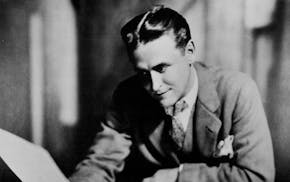Opinion editor's note: Strib Voices publishes a mix of commentary online and in print each day. To contribute, click here.
•••
It once was possible to imagine — at least if you had a lively imagination — that political campaigns had an edifying, even educational value for the American electorate. One could hope that by listening to candidates and their allies debate public policy issues voters might emerge with a clearer understanding of the choices, trade-offs and compromises to be considered once the campaign dust had settled.
This year, little room remains for such pretty illusions. The climaxing presidential cage match of 2024 is a festival of fallacies in economic affairs — tariffs, subsidies, price controls, free stuff for all — and a riot of evasions and accusations on almost everything else.
For that reason, it seems particularly useful to seize a rare moment of illumination, provided inadvertently by the latest verbal misstep (at least, I think it's the latest) from Minnesota's very own, self-proclaimed "knucklehead" governor, Tim Walz.
Last week, according to news reports, speaking at a fundraiser at the private residence of California Gov. Gavin Newsom, Walz, an ever-pedantic former teacher, treated what was likely a roomful of the well-tanned, well-coiffed and well-heeled to a lesson on why they needed to open their checkbooks to support the Harris-Walz campaign's efforts to win votes in far-flung, unfashionable corners of flyover country.
In the process Walz came up with a remarkably clear, concise and eloquent articulation of the virtue of America's Electoral College, a constitutional bulwark that Walz, like most Democrats, wants to abolish.
"I think all of us know the Electoral College needs to go," Walz is quoted as declaring. "We need … national popular vote, but that's not the world we live in. So we need to win Beaver County, Pennsylvania. We need to be able to go into York, Pennsylvania, and win. We need to be in western Wisconsin and win … ."
The Harris campaign speedily intervened to correct Walz (which is becoming a habit), with a statement explaining that abolishing the Electoral College is not the Harris campaign's position — and indeed that Tim Walz himself "believes that every vote matters in the Electoral College and he is honored to be traveling the country and battleground states working to earn support … ."
I think, um, all of us know just how honored he really is. But Walz, all the same, is exactly right about the effect of the Electoral College system. As much as he and his Golden State bankrollers might prefer to live in a different world, the Electoral College is precisely why, in real-world American presidential politics, Beaver County matters, as well as Beverly Hills. It's why York, Pennsylvania, matters right alongside New York, New York. And it's why western Wisconsin counts almost as much as Westchester.
America's constitutional framers had their own, somewhat different reasons for inventing the Electoral College. But today, without it — under a national popular vote system — presidential candidates (and, thus, presidents) would care almost exclusively about maximizing support and running up vote totals in densely populated areas like coastal California, the northeastern seaboard, Houston, Phoenix, etc.
But because the Electoral College means that presidential elections actually unfold through 50 separate state elections, with states deciding how to allocate their electoral votes (and most choosing winner-take-all arrangements), presidential hopefuls must, as Walz says, seek to win in many different places. They must find support in at least some states where rural and small-town interests and sensibilities compete with big-city perspectives.
Consider this: In 2016, Hillary Clinton famously won the nationwide popular vote by nearly 3 million votes, but lost the election to Donald Trump in the Electoral College, doing much to enflame American progressives' distaste for the college. What's worth noting is that Clinton's popular vote margin that year within the borders of California was well over 4 million votes. In short, outside California, Trump won the popular vote across 49 states.
It was the extreme concentration of Clinton's 2016 support — her lack of broad appeal around the country — that defeated her under the Electoral College.
In 2020, Joe Biden broadened the Democratic vote and carried states Clinton had lost, and for that reason the Electoral College rewarded him with victory.
In a column last year I lamented how Minnesota, with Walz's support, joined the National Popular Vote Compact, an ongoing attempt among like-minded state governments to circumvent the Electoral College without a constitutional amendment. I defended the existing system this way:
"The challenge for America has always been to govern a hugely varied population — crowded in pulsating cites and spread across lonesome frontiers. To balance such spacious differences … political representation can't be based solely on head counts. It has to recognize that rights and autonomy belong not only to individuals but also to communities of place, belief and walk of life.
"All geographic political districting — for Congress, legislatures, city councils, etc. — reflects this understanding that communities count, denying total power to aggregated at-large majorities."
In a separate 2023 column, I reported on an intriguing scholarly study that in addition portrays the Electoral College as America's best defense against fraud in presidential elections. Once again, the great advantage of the framers' creation, as Walz accidentally explained, is that one must win — or cheat — in many separate places.



